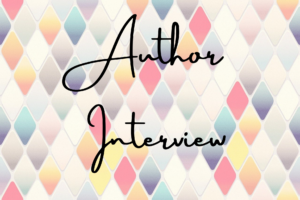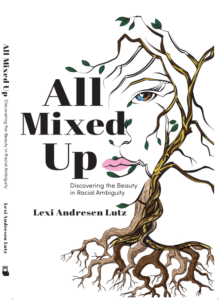Promoting Understanding and Awareness: An Interview with Lexi Andresen Lutz
 Knowledge is power, and we can all learn something from experiences that differ from ours. Lexi Andresen Lutz hopes to help others with that learning process. She is the author of All Mixed Up: Discovering the Beauty in Racial Ambiguity, a memoir released in 2023. The book “delves into the complexities of navigating different cultural identities and the importance of belonging in today’s society,” a very timely topic, especially now. Readers are calling the book a “must read for any one who is search of understanding; from coming of age teen to reflective adult,” noting that the “book provides a true glimpse into the experiences of being mixed-race.” The book offers data, personal observations and anecdotes, and actionable steps for us, as readers, as a society, to discover everyone’s unique beauty.
Knowledge is power, and we can all learn something from experiences that differ from ours. Lexi Andresen Lutz hopes to help others with that learning process. She is the author of All Mixed Up: Discovering the Beauty in Racial Ambiguity, a memoir released in 2023. The book “delves into the complexities of navigating different cultural identities and the importance of belonging in today’s society,” a very timely topic, especially now. Readers are calling the book a “must read for any one who is search of understanding; from coming of age teen to reflective adult,” noting that the “book provides a true glimpse into the experiences of being mixed-race.” The book offers data, personal observations and anecdotes, and actionable steps for us, as readers, as a society, to discover everyone’s unique beauty.
Welcome, Lexi!
Christina: Congratulations on the publication of All Mixed Up: Discovering the Beauty in Racial Ambiguity. The book stems from your experience “growing up in a multicultural household with a Filipino mother and German-Irish father.” Did you have any reservations in sharing your story?
Lexi: Absolutely. I had several reservations about sharing my story, as my multiracial identity was a topic I had really never discussed with anyone in great depth, even with those closest to me. The thought of revealing it not only to them but to potentially the rest of the world was daunting. Having had the book released for over a year now and seeing how deeply it has resonated with others has made it all worthwhile.
Christina: At any point in the process did you question your choice to write a memoir? Did you consider fictionalizing the story at one time? If not, why not?
Lexi: I never questioned my choice to write a memoir because I wanted to make sure that multiracial individuals had the opportunity to hear from someone just like them, and I wanted them to feel comfortable reaching out to me directly if they had any of their own stories or challenges to share. I think what differentiates this book from other books on the topic of the multiracial experience is that it combines personal memoir with accounts of experiences from others, as well as a significant amount of research to back up why mixed individuals may feel out of place in certain instances. I am thrilled that individuals from all over the world have reached out—even as far as New Zealand—asking questions about how to navigate the multiracial experience and relationships with others who may not fully understand this perspective.
Christina: Memoir often forces us to be vulnerable and exposed. How did you prepare yourself for facing that vulnerability?
Lexi: Embracing vulnerability in my memoir was like preparing to sky-dive: exhilarating, terrifying, and inevitable once you’ve leapt. The overwhelming positive response I’ve received from readers—both from multiracial and monoracial individuals—proved that sharing my story was worth every moment of vulnerability. The book’s message appears to have resonated with many people that maybe wouldn’t have otherwise been able to uncover it if I hadn’t shared my own personal experience. This positive feedback has affirmed the value of me opening up in the book and sharing stories that I would have otherwise felt uncomfortable sharing before.
Christina: “Despite a happy childhood and supportive parents, [you] often felt like an outsider while living in an environment where most people identified with one race.” What did your parents do in this regard to help? What do you wish they had done?
Lexi: My parents were always so supportive of me as an individual, but rarely pointed out the fact that I was different from my peers who were mostly monoracial (fully white). I appreciate this to the extent that I did not hyperfocus on my differences, but instead embraced similarities with my peers. As discussed in the book, I received exposure to Filipino culture through family on my mother’s side and a couple of school friends. While writing the book and even up until today, I frequently wish that I had been more involved with my Filipino heritage when I was younger; however, I was also concerned with fitting in with my peers and the culture in my peer groups was overwhelmingly white. I certainly do not fault my parents for my lack of exposure to Filipino culture. It would’ve been great if I had more knowledge and felt more pride when I was younger in my Filipino heritage, but it is never too late!

Christina: The saying “it takes a village” applies to many situations, and that village is often the community at large. What are three simple ways for communities to support multiracial individuals?
Educating and encouraging awareness: Educating friends, family, colleagues, and the public about racial categorization biases and their impact on those experiencing said biases is crucial. Individuals, whether multiracial or not, can talk about their own experiences or that of others and engage in discussions on complexities of multiracial identity to promote better understanding and awareness.
Promoting diversity and inclusion: I know that the term “DEI” has received a great deal of criticism and backlash recently due to the term being used so much that it has almost been rendered meaningless. I feel, however, that this specific topic of multiracial identity is an area of DEI that has been mostly missed and not discussed as openly as it could or should be. This goes hand-in-hand with the first point, education and awareness. Promoting DEI in your networks, whether that be social or professional, and using the book to lead a book club to share different perspectives from those within your network promotes inclusivity, education, and open-mindedness when it comes to these issues that aren’t as frequently talked about.
Challenging stereotypes and speaking up: There are several examples I share in the book where I could’ve taken my own advice on this….but if you see something, say something. When someone makes a comment or asks a question that could be interpreted as stereotyping, regardless of their intent or malice, it is crucial to address it. By informing individuals of how their behavior can be perceived, we encourage greater observance and self-awareness in the future.
Christina: Can you tell us a little bit about your journey to publication? How did you decide to go with a hybrid press?
Lexi: My brilliant friend, Betsy Mack Rinke, authored an impressive business memoir that was published by Warren Publishing in 2019. Having read her book after it was released, I admired not only the insightful content of her book, but also the quality of her book as a product. Though I hadn’t considered writing a book myself at the time that I read hers, when inspiration struck during quarantine to start writing my manuscript, Warren Publishing was my first choice due to their local presence and exceptional support for new authors. Working with Warren as a hybrid publisher was incredibly beneficial for me as a first-time author because I knew absolutely nothing about the publishing process. As a hybrid publisher, Warren guided me through every detail with care and precision, provided me with additional rounds of edits that the manuscript desperately needed at its inception, and helped with the marketing aspect of the book, which was also a brand new world for me.
Christina: Did your background in law inform your writing at all? Have you always been a writer? Do you think law and writing activate different parts of your brain?
Lexi: I’ve always had a passion for writing ever since I can remember. Crafting legal documents and writing a memoir to connect with others engage very different parts of the brain. I believe my background in legal research and writing was invaluable when developing the more research-intensive sections of the book. On the other hand, my personal routine of journaling certainly helped in drafting the more personal memoir portions of the book. Writing brings me immense clarity and organization of thought—a benefit I could only achieve through regular writing practice.
Christina: I need to compliment that book cover! It’s so striking. Who designed it? Did you have input on it?
Lexi: The talented team at Warren Publishing designed my book cover. Before they started, they asked for my vision, and I described a tree with roots forming into a face. They truly understood the assignment and brought my idea to life beautifully—I couldn’t be happier with the result!
Christina: A book like yours would be good for library and community discussions, and it would be a great addition to school libraries. Is going out into the community to begin a dialogue on your agenda? What message would you like to send with the book and with that dialogue?
Lexi: Absolutely! I’ve been fortunate to have had the book as the main topic of book clubs and speaking engagements, and I’m eager to engage with more people in more events to spread the message far and wide. My goal is to ignite meaningful conversations and foster understanding. While the book delves into multiracial experiences, it’s not just for multiracial individuals; people of any race or walk of life can find something to relate to, whether it’s feeling out of place in society or the journey of discovering one’s identity. Through community and educational discussions, I hope to inspire dialogue on identity, resilience, and the power of personal stories to connect us all.
Christina: What’s next for you?
Lexi: I’m thrilled to share that more book clubs and speaking engagements are in the works, as well as a podcast appearance where I will briefly discuss the book. I’m passionate about spreading the book’s message through writing and speaking, and I embrace every opportunity to connect with readers. People often ask if there’s another book on the horizon—while there are no immediate plans for a second book, you never know what the future holds!
Lexi can be found in multiple places!
Website: https://allmixedupbook.com/
Instagram: @allmixedupbook
Thanks to Lexi for agreeing to this interview! If you know of an author or artist who’d like to be featured in an interview (or you would like to be featured), feel free to leave a comment or email me via my contact page.

